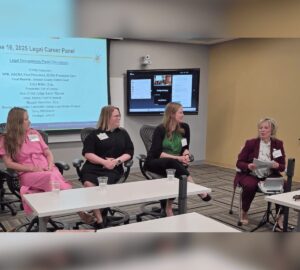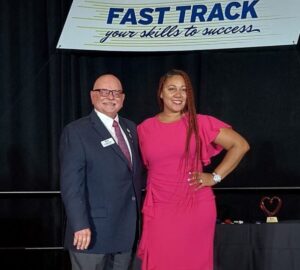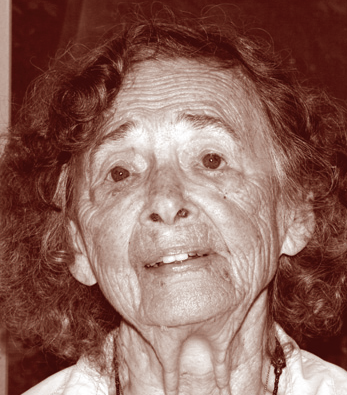 Dorothy Huffman of Indianapolis, Ind., recently retired after nearly 70 years of active court reporting. I had the chance to sit and talk with her about her career and her life away from the stenotype machine. When I grow up, I want to be Dorothy!
Dorothy Huffman of Indianapolis, Ind., recently retired after nearly 70 years of active court reporting. I had the chance to sit and talk with her about her career and her life away from the stenotype machine. When I grow up, I want to be Dorothy!
What made you decide to become a court reporter?
I wanted to be a concert pianist, but I was going to school in my hometown to be a teacher. I didn’t want to be a teacher. At the time, I had already taken a year of Gregg shorthand, which I didn’t like. I was good at it in the beginning, but then I realized that if I do too well, they’ll make me take another year, so I decided I wouldn’t try as hard. I took a year off from school to earn some money so that I could afford to go to school to study piano, and I needed to get a job. I was given an aptitude test that I initially thought was all hype. On a steno keyboard, we had to move our fingers across the top of the machine, then back across the bottom, and we had to write “you are” as fast as we could. Being a pianist, I was able to do well on this test. Even though I didn’t like Gregg shorthand, I thought this stenotype looked much more interesting, so I signed up.
Where did you attend school?
I attended Skadron Court Reporting School in Fort Wayne, Ind. The head teacher believed that you should never have to learn things twice, so he taught us brief forms from the very beginning. As far as vowels, most teachers said, “Context will tell,” but my teacher gave us many examples where context doesn’t tell, so he taught us long vowels from the beginning. One example where context won’t tell that I recall is “I bet you” and “I beat you.”
I still have the steno machine that I learned on. It was a secretarial model that took smaller pads of papers. Mine was a demo, so it had the letters on the keys.
Tell us about the jobs you’ve held.
During World War II, I got a job on the local base as a stenographer. At that point, I was able to write well enough on the steno machine to do that kind of work. I worked for the aircraft engineering department where I would transcribe highly secret telephone conversations that related to how to repair the military airplanes.
After the war, I went to work for the Pennsylvania Railroad as a court reporter. I worked at the superintendent’s office in Fort Wayne. I reported the trials that dealt with infractions of conductors and engineers. It was wonderful training because I had to transcribe every single thing I wrote down.
Then I got married in 1942, and my husband and I moved to Indianapolis afterward so that he could take a job as a horn player with the Indianapolis Symphony Orchestra.
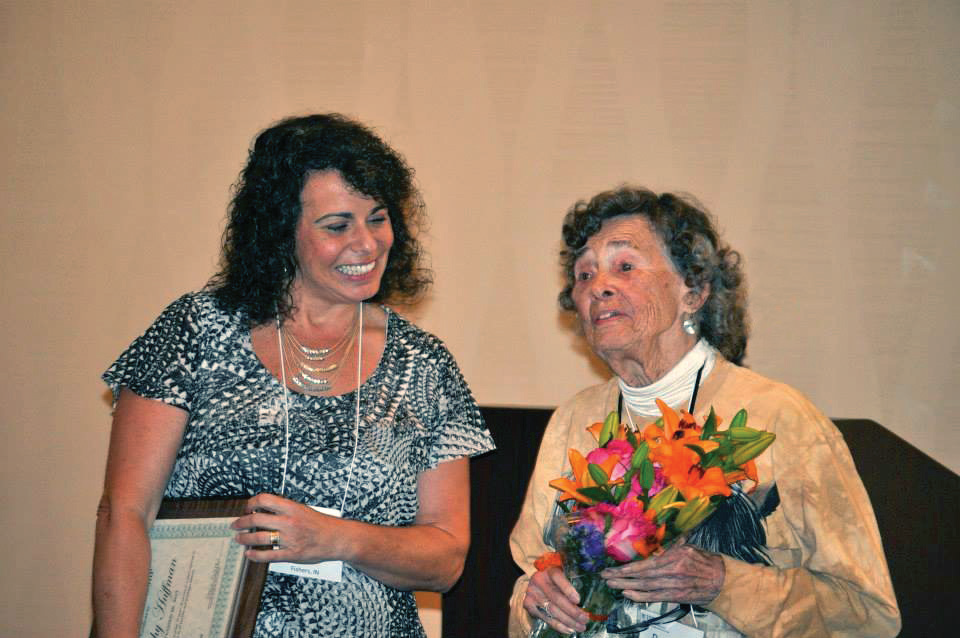 Did you continue working as a court reporter when you moved to Indianapolis?
Did you continue working as a court reporter when you moved to Indianapolis?
I wanted to take some time off from work because we had two small children. My husband and I bought a double home when we moved here (a semi-attached home). The day we moved in, I didn’t yet have a telephone, so I went to the home on the other side of the double to borrow their phone. I noticed pads of stenotype paper that people were using to make notes next to the telephone. My new neighbor was also a court reporter!
After the symphony season ended, I decided to take a night job to earn some extra money, so I started teaching steno at the Consolidated Business College. I taught my students as my teacher had taught me and gave them briefs from the start. One of my students became a court reporter and replaced me years later when I left circuit court.
You eventually went into the courts. Tell us about that.
I took a job in criminal court for two years, and then for 16 years, I was in superior and then circuit court with Judge Niblack. The court reporter’s job was a political appointment back then. I hadn’t yet voted, so there was no record of whether I was a Democrat or Republican. Although I had to join the party in office, vote for that party, and be approved for the job by the party, Judge Niblack wanted somebody who could actually do the court reporting job and not just a political appointment. I always admired him for that.
After 16 years with Judge Niblack, I became a freelancer with Powell and Oakes in Indianapolis and eventually became independent and remained that way until earlier this year.
Would you tell us about switching to a CAT system?
I was the first person in Indiana who went on the computer. I still have one of the disks – it was 15 inches in diameter, a couple inches thick, and it held just 100 pages. The computer itself was the size of a small refrigerator. I remember the first transcript I turned out with this wonderful computer. It was just 29 pages, and it took a very long time to get it right. One thing I remember is that the word “aggravation” was said several times in the transcript, and each time it translated as “ago gray vacation.”
How about the threats to steno reporting?
When tape recorders were introduced, we did have some worries. They tried to get Judge Niblack to put in tape recorders because they were supposed to be so much better, but he refused. He told them, “I’ll put my reporter up against your recorder any day.” Judge Niblack did more for court reporters locally than anyone else. In fact, he was the one who was instrumental in getting our pay raised to $200 a month.
What changes have you seen over the years?
When I became a reporter, it was a male profession. Because of World War II, there weren’t male reporters available, and so women started becoming reporters. There was also smoking everywhere – not just in depositions, but also in courtrooms.
Back before air conditioning, windows were left open all the time, and sometimes the windows at the top were left open overnight. The rain would come in, and things deteriorated. I came into my office one morning and the ceiling had fallen down on my couch. I’m glad it didn’t happen when I was sitting on it.
Do you have any funny stories from court?
This was an interesting way to get a recess: During trial once, a big rat fell down right next to me. A live rat. He was huge. The ceiling was 30 feet up. The fall didn’t kill him, but it did knock him senseless. I was happy that the judge took a recess after that happened.
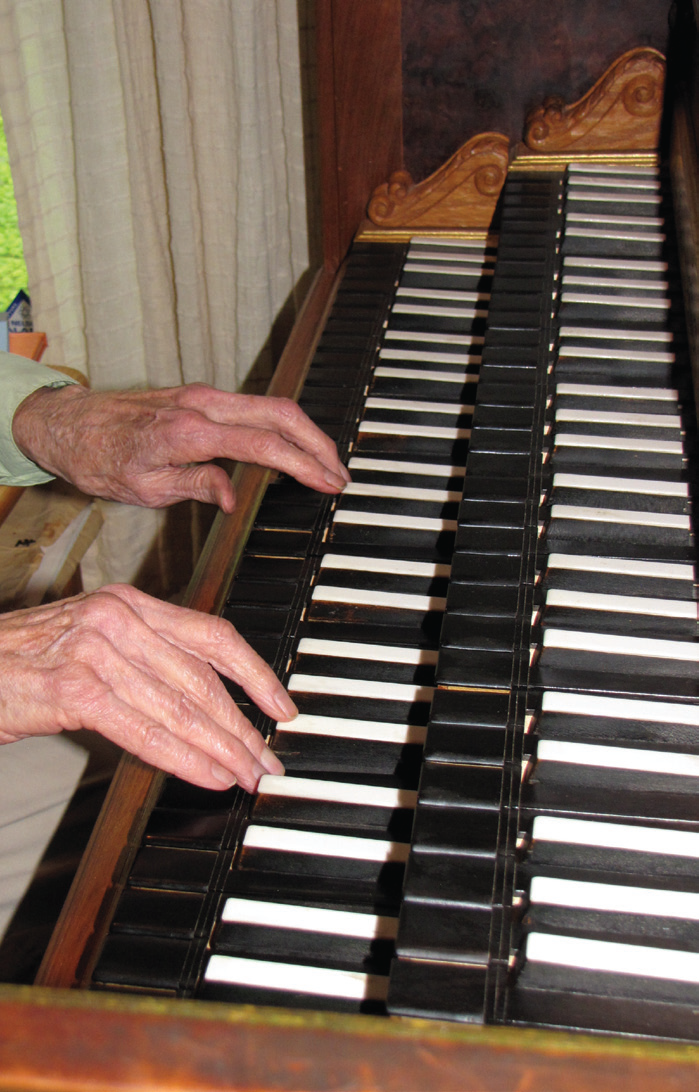 I see you have a couple of harpsichords in your living room. Is this one of your hobbies?
I see you have a couple of harpsichords in your living room. Is this one of your hobbies?
I have a harpsichord concert coming up in a couple of weeks. I have also played the organ, the piano, and the cello.
Any other hobbies?
I am leaving soon for a weeklong horseback riding and camping trip in the Canadian Rockies. I will be riding with the Trail Riders, which is a group that has been in existence for 90 years. It started the same year I was born.
It sounds like you like to travel. Any other exciting travels you’d like to share with us?
Back when I was just 70 years old, I resigned as organist from my church. They gave me a gift, and instead of putting it into my retirement account, I decided to use it to travel. I flew to Norway and went cross-country skiing for two weeks.
Did you say you were 70 years old when you did that?
Yes. Then later, after I had hip surgery, the doctors wanted me to rehab on a stationary bike. I did that for a little while, but I didn’t want to sit at home and ride a bike, so instead I flew to Holland and rode a bike there for three weeks.
Tell me about your family.
I have two daughters, and they are both musicians. One lives in South Bend, and the other lives in Colorado. I have four grandchildren. They don’t live nearby, so I love to travel to see them. In fact, after the horseback riding trip next month, I will be driving to Portland, Ore., to see my grandson. I love to drive.
How long have you been a member of the Indiana Shorthand Reporters Association?
Ever since I got my first job with the courts. Way back then, some of us wanted to get certification, but we didn’t get much support from other reporters because most of them were political appointees who could never have passed a test of any kind.
Can you believe we’re still dealing with that issue, trying to get mandatory certification in Indiana?
You’re going to make it someday.
We are all impressed by you, Dorothy, to have reported for so many years, all the way up to the age of 90.
I always told myself that I was going to report as long as my ears and my fingers and my brain still work. I reported my last job in January, and I thought to myself: “You’d better stop while you’ve got a good reputation and before you absolutely have to.”
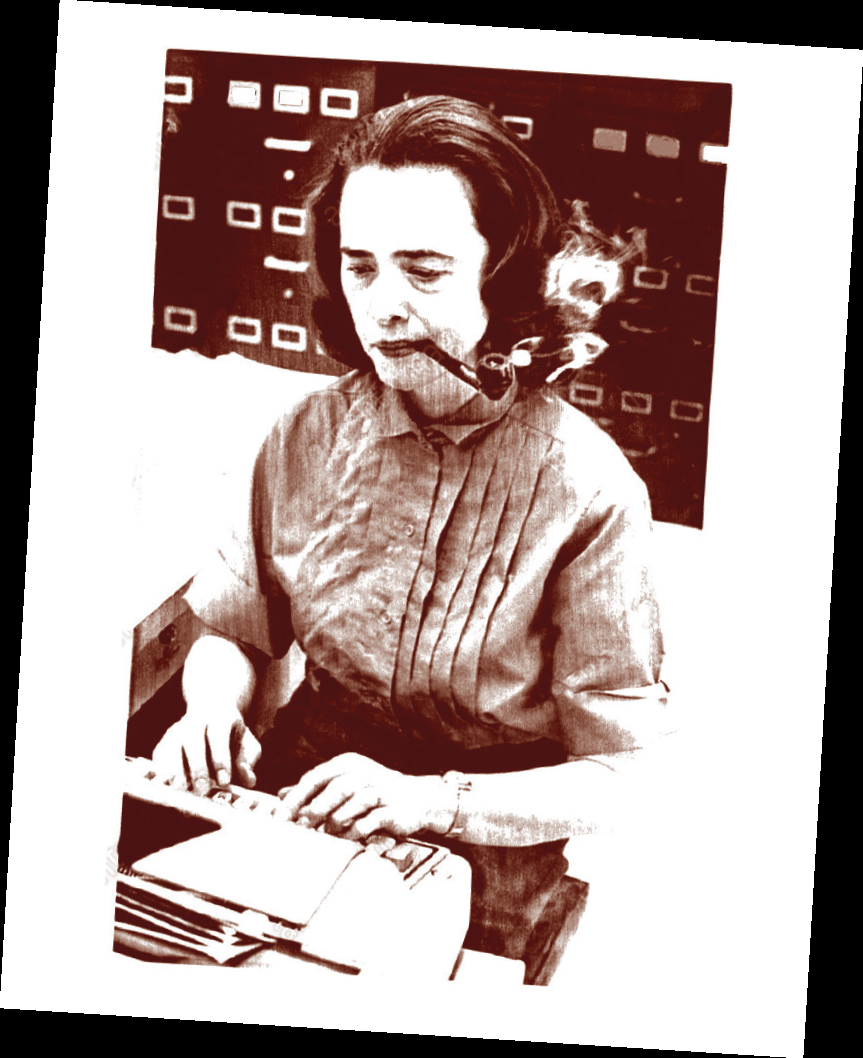 The photo of you from the 1960s, sitting at a typewriter with a pipe in your mouth, is so intriguing. Can you share the background story?
The photo of you from the 1960s, sitting at a typewriter with a pipe in your mouth, is so intriguing. Can you share the background story?
That was back when I worked for Judge Niblack. He had been a newspaper reporter, and he got more publicity than anyone else because he knew when to bring in the media. He might call up the paper during an interesting trial and say, “Come in at 10. We’ll have a witness that you may want to hear.”
The Surgeon General had just come out with the report that smoking cigarettes was bad for you, but pipes weren’t quite as bad for you, so I smoked a pipe for a while. It was great to be able to smoke my pipe at the typewriter and not worry about ashes falling onto the paper. Judge Niblack knew that it was a good story, so he called in the media. I’m not particularly proud that I smoked a pipe back then, but that picture went all over the United States.
(Dorothy played the harpsichord at the end of the interview. I was a concert pianist in college, and I will share with you that I was amazed at her skill. The instrument seemed to spring to life under her fingers, almost as if electricity were coursing through it. Truly amazing.)
Janine Ferren, RPR, CRR, is a freelance reporter in Indianapolis, Ind., and is the treasurer of the Indiana Shorthand Reporters Association. She can be reached at janine@ferrenfamily.com.

